Opinion
A nuclear power plant in a hurry:for whose benefit?

Recent media reports of our interim Government’s hurried approval to install a Russian-backed Nuclear Power Plant in Sri Lanka. The purpose is unclear.We are desperately trying to reduce our fossil fuel consumption to reduce the burden on our limited dollar reserve, reduce our carbon footprint as a resolution to curtail our natural disasters and promote renewable energy to reduce the cost of power in Sri Lanka to attract investments. However, approval of a nuclear power plant completely contradicts this sensible strategy.
Nuclear power is not a solution to our power crisis. Today, more than 50% of our energy requirement is fulfilled by renewable energy. If all goes according to plan, a nuclear power plant will take at least 10 years to construct before it can generate electricity to light even a single bulb.
Nuclear power generation depends on imported uranium, and this project shall only exchange our dollar consumption from fossil fuel to uranium with an added dollar requirement to fund the export of uranium waste for safe disposal. This will only worsen our ‘debt crisis’ for generations.
Electricity costs for the consumer will remain continuously high, repelling any investors interested in commencing business activities in Sri Lanka. Thanks to our leaders, our ordinary people will have no opportunity to flourish through employment. Poverty will become extreme with public unrest, leading to more property damage and human loss.
Our contract with currently war-ridden Russia is more likely to be fluid than solid whilst importing Russian geopolitics to the heart of our motherland.
Along with this, we are also importing the danger of a nuclear disaster in Sri Lanka, a non-existent risk at present. Such a disaster will leave an area of at least a 35-mile radius completely inhabitable for centuries. See Chernobyl, the disaster in 1986, still inhabitable 35 years later.
It is another opportunity for our oligarchs to continue to exploit ordinary citizens, as nuclear power needs continuous imports and exports for its functioning.
This project appears to be another ‘white elephant’ in the making, similar to many other projects that are in limbo, costing millions to ordinary citizens and making their lives miserable.
Patriotic leaders should fully explore renewable power generation sources, such as hydropower, wind power and solar power, that will have no dependence whatsoever on the import of any fuel. That is the sensible approach in this current crisis, but the opposition is conspicuously silent – do they also have a share? This is an opportunity for our investigative journalists to explore and publish the pros and cons, if there are any left in Sri Lanka.
Chula Goonasekera
On behalf of the LEADS forum
admin@srilankaleads.com
Opinion
Franklyn Amerasinghe: an appreciation
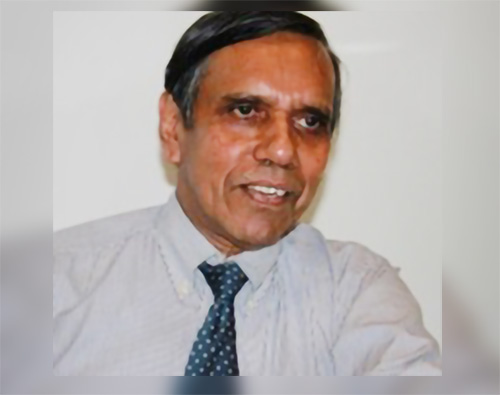
It was 1979. I had just married and was trying to manage my fledgling legal practice in Kurunegala when Franklyn Amerasinghe attracted me to the Employers Federation of Ceylon (EFC). I basically followed what he did 5yrs earlier; the exception being that when he left Kurunegala, he also left a lucrative Practice built by his late father. From then onwards, for the next 45 years he was my colleague, boss, friend and above all; professional and personal guide. I was indeed fortunate as a young professional in the EFC to have had S R de Silva, the doyen of Sri Lankan Industrial Relations and the late Franklyn as my bosses. I am ever grateful to them both for whatever I achieved professionally; ending my working career with the International Labour Organisation in which they served with distinction before me.
I will not dwell herein on the professional attributes and achievements of Franklyn. Neither can I do justice to that aspect in this short piece. Instead, I will attempt to capture what I knew of Franklyn the man. He was personally exposed to the vicissitudes of life in his youth and again thereafter when his loving wife Neelanthi passed away while their two daughters were still school going. These circumstances which would have drained a lesser mortal brought out the best in Franklyn’s innate strong character. Whilst being the devoted father to his young children and successfully managing his professional career, he was also the “go-to person” to so many in need of professional or personal help. With his children grown up and on their own feet, the demands on Franklyn’s time from others only increased. Regardless of social or official status, old or young, he gave wise counsel ungrudgingly and always found time for them. What fascinated me was his ability to make all those who knew him feel that there was a special place in his heart for each of them. They in turn considered him to be special.
Perhaps, it was this unique gift that enabled him to give inspirational leadership to those who worked with him. His faith in humanity was boundless. He genuinely believed that no person was useless. It was this faith that drew him to help the helpless. Few would know of all what he has done or the sacrifices he has made, to assist the less fortunate get on their feet, without breathing a word of what he had given or lost in the process. The “Diamond Trust” he initiated with the support of close friends and family in later years to facilitate learning for handicapped children was a dream come true for him. The Trust was his precious baby in the last days of his life. His wish to see the baby nurtured into adulthood is now in the able hands of his daughters and family. While he will be remembered for his philosophical strengths, he will also not be forgotten by those of us who knew him personally for his social camaraderie. A sportsman himself, he loved sports. So was it with music. His wit and humour was infectious. Many were the long hours he spent with family and friends signing old favourites around a Piano, late into the night at parties. This sense of camaraderie he shared with his office colleagues as well.
We who were at the EFC with him, will recall the family atmosphere he promoted among us. He was truly a man for all seasons. It was my privilege to have had known Franklyn. It will not be easy to fill the void he has left in my life and that of my family. The last audible words he said to me were “I will soon let you know what it is like on the other side” I know for certain that wherever he may be the grass there will be far greener than on this earth. To Michelle and Sharon, the loving daughters of a devoted Father, the tender care you showered on Dad, particularly in his final days was truly exemplary.
Gotabaya Dasanayaka
Opinion
Social responsibility of the media

In Sri Lanka, established media channels, particularly television, play a crucial role in shaping public perception on various aspects of life, including both local and international politics. Social media, however, has also become a powerful force, frequently spreading biased or manipulated content that risks fragmenting communities and damaging the social fabric, especially during sensitive times such as general or presidential elections.
Sri Lanka’s media has long been aware of the full spectrum of public life in the country—the good, the bad, and the troubling. They understand that political corruption and malpractice have significantly contributed to social unrest, economic decline, and the deterioration of essential services like education, healthcare, and nutrition. This has prompted many citizens to emigrate, leading to a damaging “brain drain.”
Media outlets also recognise the challenges in electing better leaders. Entrenched politicians have erected legal and financial barriers to safeguard their positions, making it difficult for ordinary citizens to participate effectively in elections. Additionally, the high cost of media exposure during election seasons makes it nearly impossible for average citizens to run for office. While media organisations often use this period to maximise profits, it would be commendable if they could support underrepresented and less privileged candidates, contributing to the public good.
As we approach a pivotal general election, we urge these influential media institutions to uphold their social responsibility. Since media ultimately relies on public support, directly or indirectly, they have to prioritise the public interest. At this critical moment, we, as citizens, need to elect honourable, honest, and patriotic individuals who can act as “watchdogs” in Parliament and help guide our nation toward better governance. We respectfully request that significant media outlets dedicate at least a small amount of airtime to non-political candidates vying for a seat in Parliament. Providing even a few minutes of prime airtime for these candidates to present their mission and vision would be a meaningful gesture toward equal representation. This commitment to the nation’s well-being would be widely appreciated. After all, true equality—the very principle that media frequently champions for its own survival—is now an ideal that can extend to all.
Chula Goonasekera (admin@srilankaleads.com)
On behalf of the LEADS forum
Opinion
Weaponising race
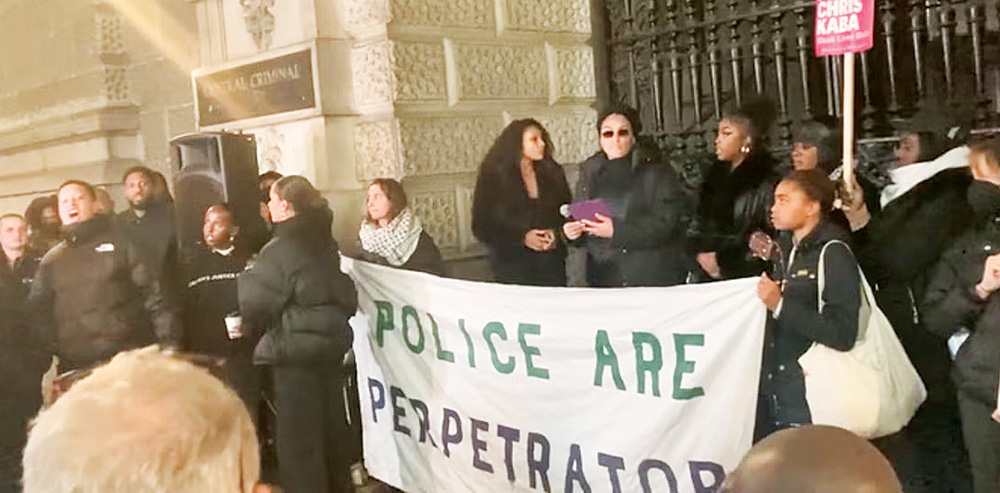
by Dr Upul Wijayawardhana
In the evening of 22 Sept., 2002, in Streatham Hill in south London, Metropolitan police in pursuit of a vehicle believed to be involved in a ‘firearm incident’ the previous day, cornered it but the driver attempted to speed away by ramming police vehicles, when an armed police officer fired a single shot through the windscreen. The injured young driver named Chris Kaba was admitted to hospital, but he died the following day. Police action appeared to be justified, but the driver happened to be black and no firearm was found in the vehicle or vicinity, there was a massive uproar, branding the incident as an instance of police brutality, with vigils displaying ‘Black Lives Matter’ signs.
Unlike in the US, the British police do not shoot at drivers of whatever colour and thought this was a rare incident, politicians including the former leader of the Labour Party Jeremy Corbyn readily joined the bandwagon of condemnation. The most significant amongst the politicians was the Labour Mayor of London, Sadique Khan, who has purview over the Metropolitan Police. Justifiably lamenting the loss of a young life, he said he understood “the grave concern and the impact of Chris’ death on Black Londoners across our city and the anger, pain and fear it has caused – as well as the desire for justice and change”. The implied blame without any investigations can only undermine the police but that is how politicians behave!
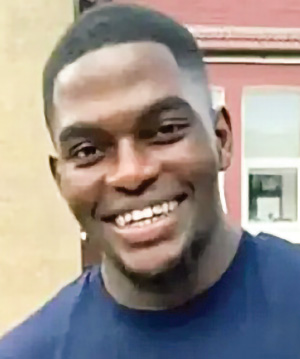
Chris Kaba
Whenever a death occurs due to police action or in police custody, it is mandatory in the UK for the incident to be reported to the Independent Office of Police Conduct (IOPC), this incident being no exception. After an investigation lasting seven months IOPC referred the case to the Director of Public Prosecutions (DPP) to decide whether the officer should be charged with murder. On 20 September 2023 the IOPC issued a press release which concluded with: “Following the completion of our investigation in March 2023, we referred a file of evidence to the CPS, who authorised the murder charge.” Firearm officers of the Met were very unhappy with this outcome, as they felt unprotected in performing their duties however unpleasant they may be, and over 100 officers handed back their firearms.
Charges were filed, when anonymity was lifted and the officer, Martyn Blake pleaded not guilty in March 2024, trial against him starting in Old Bailey on 02 October. After a trial lasting three weeks, a jury of six men and three women took only just over three hours to return the unanimous verdict of not guilty, much to the disappointment and annoyance of the family, who claimed that justice had not been served. Obviously, the jury believed the testimony of the police officer Martyn Blake that he had been compelled to shoot because he genuinely believed that the lives of his fellow officers were in danger as Chris Kaba, when boxed, reversed ramming his vehicle onto to a police vehicle and was attempting to drive away endangering their lives. His contention was that he felt Kaba was using the vehicle as a deadly weapon. Two other police officers testified that they had come to the same conclusion and were about to fire.
The BLM movement was furious with the verdict and its activists said: “No one can be safe while the police can kill with impunity. This verdict is not the end. It only strengthens our resolve. Now is the time to join and fight for a future where justice and accountability are the norm, and no-one is above the law.” A vigil attended by about 150 people was held outside the Old Bailey the same evening.
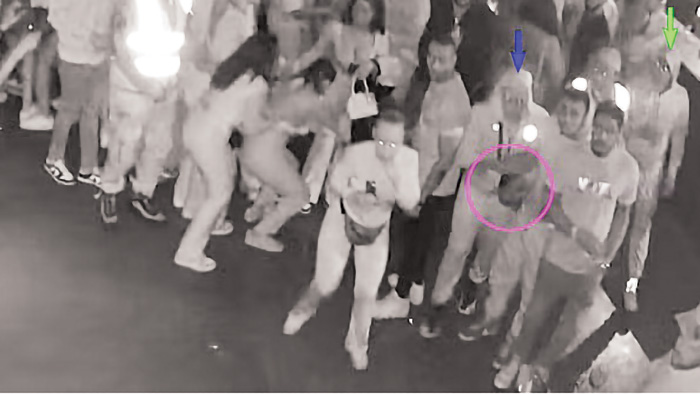
CCTV footage shows Kaba putting a handgun into his bag after shooting
a man in the thigh in a nightclub in London.
It was reported that Martyn Blake and family had to be taken to a safe house as numerous death threats have been received after the verdict. Metropolitan Police Commissioner Sir Mark Rowley, who was infuriated by the whole process, declared that Mr Blake had paid a huge personal and professional sacrifice in the two years since the shooting and that he had made “a split-second decision on what he believed was necessary to protect his colleagues and to protect London”. Whilst criticising the systems used to hold police officers who take lethal shots to account, he stated: “I worry about the lack of support officers face for doing their best, but most of all, I worry for the public. The more we crush the spirit of good officers, the less they can fight crime – that risks London becoming less safe.”
An interesting turn of events took place on 22 October, the day after the verdict, when the judge lifted restrictions on reporting the past of the victim, which had to be kept away from the jury. It appeared that Kaba had been a prominent member of a dangerous gang in London and was involved in a shooting a week before his death. Video footage released showed Kaba shooting another gang member, a rapper, in a London night club. Three other men have already been convicted over their involvement in this nightclub shooting and are serving long prison sentences. During their trial, Kaba was named by the presiding judge as the gunman, stating that Kaba shot the man once in the leg while on the nightclub dance floor, and once outside as the man tried to escape. Though Kaba died before being charged, he was later named on the charge sheet for that trial.
It transpired later that the family tried their best to prevent this information being released and they have been relatively quiet since. However, what is interesting is the response of politicians. The local MP, a Black lady, who was very critical of the police previously, stating that ‘campaigners are marching for justice for end to racism in policing’, toned down after the verdict stating, ‘Whilst police officers undeniably have a difficult job and work under exceptional pressures, this trial shows that nobody is above the law.’ However, the leader of a large trade union of teachers, who happens to be black, stated that Kaba got the second tier of justice! The most revealing comments come from the Mayor of London, who stated “There’s clearly still a wider lack of trust in the police, particularly within the black community, that needs to be addressed”. He said he was planning to hold the Metropolitan Police to account to ensure that lessons are learnt. Words of the head of the Metropolitan Police seem to have fallen on deaf ears! Sounds familiar: politicians would weaponise anything, race, religion being the commonest, for their advantage.
Whilst Israel, a state created on the basis of race, is massacring in Gaza, thousands of innocent civilians of a different race displaced due to its creation, world leaders turn a blind eye and a deaf ear. Whilst Sri Lanka is continuing to be harassed by the international community for the sin of militarily defeating a ruthless terrorist group, Israel’s fanciful explanations why it is killing so many innocents are readily accepted. What hypocrisy?
-

 Business5 days ago
Business5 days agoStandard Chartered appoints Harini Jayaweera as Chief Compliance Officer
-
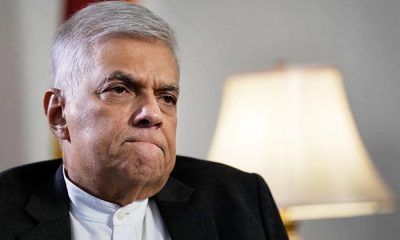
 News6 days ago
News6 days agoWickremesinghe defends former presidents’ privileges
-
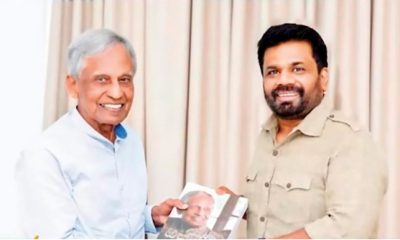
 Opinion6 days ago
Opinion6 days agoDevolution and Comrade Anura
-

 News4 days ago
News4 days agoFifteen heads of Sri Lanka missions overseas urgently recalled
-

 News4 days ago
News4 days agoFive-star hotels stop serving pork products
-
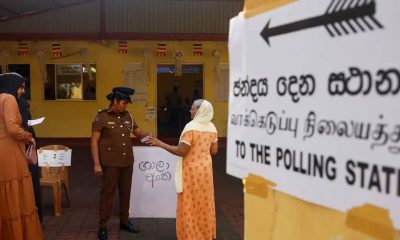
 Features4 days ago
Features4 days agoWaiting for a Democratic Opposition
-
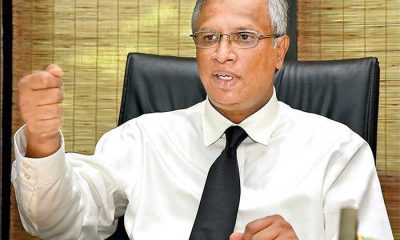
 News3 days ago
News3 days agoITAK denies secret pact with NPP
-

 Sports6 days ago
Sports6 days agoChamika, Anuka shine as Mahanama beat Nalanda










